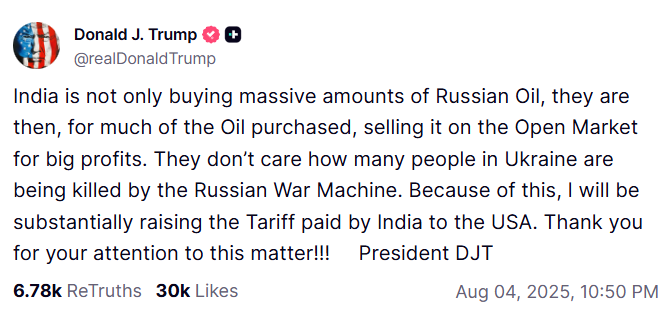US President Trump on August 4th posted on his social platform Truth Social, criticizing India for continuing to import and resell large amounts of Russian oil, stating that India has not considered the war damage Russia caused to Ukraine, and therefore plans to "significantly raise" tariffs on Indian goods:
India not only purchases large amounts of Russian oil but also resells most of it in the open market, earning huge profits. They do not care how many Ukrainians have been killed by Russia's war machine. Therefore, I will significantly raise the tariffs India must pay to the United States.

New Delhi Counterattack: Energy Sovereignty and Double Standards
Facing pressure from the White House, Indian Foreign Ministry spokesperson Jaishankar directly refuted the US accusations as "unreasonable". He said that after the Russia-Ukraine conflict, Europe seized traditional oil sources from the Middle East, and India could only purchase Russian oil at a discount to stabilize oil costs for 1.4 billion people.
He further pointed out that the US still purchased uranium, palladium, and fertilizers from Russia in 2023, with bilateral trade of about $3.5 billion; the EU's commodity trade with Russia in 2024 reached 67.5 billion euros, so singling out India-Russia trade is "unfair".
Jaishankar reiterated the "Atmanirbhar Bharat" (self-reliant India) strategy, stating that the government "will take all necessary measures" to protect energy and economic security.
Moscow Supports: Criticizing US 'Illegal Trade Pressure'
Meanwhile, Kremlin spokesperson Peskov also responded to Trump's threat on August 5th, calling the US approach "illegal trade pressure" and emphasizing that sovereign countries have the right to freely choose trade partners.
He noted that Russia accounted for 35% of India's oil imports in the first half of 2025, about 1.75 million barrels per day, making India the second-largest Russian oil buyer after China. Peskov also called for restraint on nuclear issues, suggesting that Russia-India energy cooperation should not be interfered with by external pressures.
Global Market Reveals Fragile Cracks
US-India trade relations have been continuously tense in recent years due to India's high tariffs (especially agricultural tariffs as high as 39%) and non-tariff barriers. In the 2024-2025 fiscal year, bilateral trade reached $186 billion, with India having a trade surplus of about $41 billion. The US believes that India's high tariffs have caused trade imbalances, and Trump is using the Russia-Ukraine war to curb this trend.
Market analysis suggests that this tariff threat, if forcing India to reduce Russian oil purchases, might push India to seek alternative sources in the Middle East and Africa, ultimately driving up international oil prices; the US might also face retaliatory measures from India. In the long term, this incident may encourage India to deepen collaboration with non-Western countries like Russia and China in multilateral forums, potentially further complicating the already fragmented global landscape caused by the Russia-Ukraine war.






